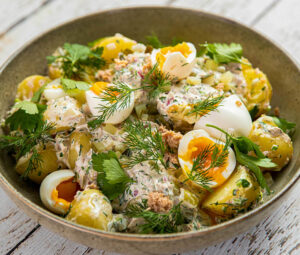5 Ways to Boost Mood by Ashleigh Feltham Accredited Practising Dietitian and Accredited Nutritionist
 No one can deny that feeling happy makes life better. There are several compounds, like hormones and neurotransmitters, that make you feel happy, and one of these is dopamine. Dopamine influences many components of your life, including movement, personality and memory.
No one can deny that feeling happy makes life better. There are several compounds, like hormones and neurotransmitters, that make you feel happy, and one of these is dopamine. Dopamine influences many components of your life, including movement, personality and memory.
The brain produces dopamine to create a feeling of pleasure.
It encourages us to seek out the behaviours linked to the release of this neurotransmitter. Here are five ways to boost mood with lifestyle strategies you can add to your day to increase the ‘happy’ in your life.
1. Eat to Feel Happy
It may surprise you to read that food impacts how much dopamine your body produces. Several foods contain amino acids, called phenylalanine and tyrosine. These protein building blocks are precursors to the production of dopamine.
Good sources of phenylalanine and tyrosine include dairy, pork, seafood, poultry, eggs and lean red meat. Plant protein is also a good source of these two amino acids, found in tofu, nuts, seeds, wholegrains and beans.
On top of this, ensure that your diet contains all the essential food groups and a variety of them. This will equip your body with the components needed to create dopamine from essential vitamins and minerals, as well as essential fats like omega-3 polyunsaturated fat. Fatty fish like sardines, herrings, mackerel and salmon provide good sources of not only phenylalanine and tryptophan but also omega-3 and a matrix of essential vitamins and minerals.
2. Maintain an Optimal Gut Microbiome
The direct link from your gut to your brain is called the brain-gut axis. Your brain recognises a gut microbiome in a state of good health, resulting in an increase in the production of dopamine. The contrary is also true; your brain knows when your gut is in a state of dysbiosis or imbalance, negatively impacting dopamine levels.
Aim for 30 different plant-based foods a week for an optimal gut microbiome. Include whole plant foods like whole grains, nuts, seeds, vegetables and fruit. Each of these has different types of fibre and prebiotics, which feed the health-promoting microbes in your gut and help them thrive. Secondly, include two sources of probiotic and/or fermented foods daily, like probiotic-rich yoghurt, kimchi, tempeh, kombucha, sauerkraut and miso.
3. Move to Feel Good
Movement is linked to increased dopamine levels. As little as ten minutes of daily physical activity has been shown to increase levels of dopamine in your body. It’s important that you choose an exercise that you enjoy. This way, you are likely to stick with it and create a lifestyle of health, well-being and happiness. To help get you started, try yoga, dance, weightlifting, running, skipping, walking the dog, cleaning with vigour, group fitness classes, swimming or cycling.
Adding music to your workout can further enhance the release of dopamine. So make sure you listen to your favourite tunes during your chosen activity.
4. Find Your Zen
Meditation has been shown to have many positive effects on the brain. One of these is an increase in the production of dopamine. Meditation does take practice. Setting aside as little as five minutes each day is a great way to start. Free sources of guided meditation, such as apps and YouTube channels, are available to help you get started.
5. Get Enough Sleep to Feel Your Best
Suboptimal sleep can leave you feeling suboptimal all day. There are many reasons to ensure you are getting adequate sleep each night. One reason is for the optimal production of dopamine. Adults should aim for seven to eight hours sleep, with no less than six hours each night.

Take home message
Feeling your best is largely linked to your lifestyle choices. Develop a lifestyle of eating well, enjoyable activity, meditation and good sleep. These five strategies can boost your levels of dopamine to help you to feel your best, for life.

References:
- González-Arancibia C, Urrutia-Piñones J, Illanes-González J, Martinez-Pinto J, Sotomayor-Zárate R, Julio-Pieper M, Bravo JA. Do your gut microbes affect your brain dopamine? Psychopharmacology (Berl). 2019 May;236(5):1611-1622. doi: 10.1007/s00213-019-05265-5. Epub 2019 May 17. PMID: 31098656.
- Lin TW, Kuo YM. Exercise benefits brain function: the monoamine connection. Brain Sci. 2013 Jan 11;3(1):39-53. doi: 10.3390/brainsci3010039. PMID: 24961306; PMCID: PMC4061837.
- Salimpoor, V., Benovoy, M., Larcher, K. et al. Anatomically distinct dopamine release during anticipation and experience of peak emotion to music. Nat Neurosci 14, 257–262 (2011). https://doi.org/10.1038/nn.2726
- How to Increase Dopamine Naturally. Life Extension.











Comments are closed.